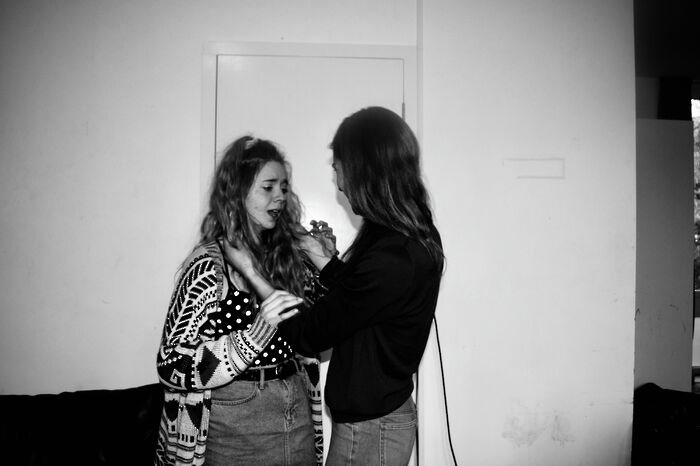Romeo x Juliet review
This modern take on Shakespeare’s most iconic love story does not manage to gel its London setting to Shakespeare’s language, despite some good performances

Everyone has an opinion on Romeo and Juliet. You can love it or hate it or be indifferent about it, or maybe a mix of all three, but it’s hard to find someone who doesn’t know about Shakespeare (and indeed, English literature’s) most famous love story. Perhaps this makes the adaptation and staging of it a daunting task, but there’s also an undeniable freshness to adaptation.
I found the initial concept of the Marlowe Society’s annual BME Shakespeare to be compelling at the very least; there is naturally something very exciting, especially for a Londoner such as myself, about the idea of Benvolio and Mercutio eating chicken from the chicken shop, and Romeo and Juliet dancing to Stormzy; more importantly, I looked forward to the potential power of a reclaiming of Shakespeare by transposing him onto the streets of a modern city.
Often a problem with productions of Shakespeare at Cambridge is that the concept overpowers the play itself, and the essence of it and of the writing disappears. Unfortunately director Hannah Shury-Smith’s production seemed to have the opposite problem. Visually speaking, aside from costume (astutely designed by Temi Longe) and the occasional sighting of boxes of chicken and chips, very little was used to indicate where we were; the set was entirely minimalist, made up of two opposing sets of stairs and a block that became a bed in the middle, but this was a shame in a production which undoubtedly would have benefited from some more elaborate set pieces and attention to detail. The stairs may have made a compelling centrepiece if they had been used more (naturally just the image of them evoked themes of separation central to Romeo and Juliet), but blocking didn’t make as much use of them as they could or should have. This combined with lacklustre lighting design, and sound design which at times was misplaced in a way that was jarring (occasionally underscoring monologues in a way that was distracting) made the concept feel like an afterthought, only occasionally tacked on in a way that didn’t quite gel with the play or enrich it in the way one hoped it would.
"Performances unfortunately too often had a recited quality to them, or were very one-note."
This issue contributed to the show’s largest problem. For Romeo and Juliet to be truly compelling as a tragedy, the audience must feel invested in the action; they must feel the sharp danger of violence, the pain of loss, the giddiness of first love. This was an idea that unfortunately was never quite tapped into by actors or the direction, and it meant that the stakes were never quite high enough. Fights (though well-choreographed and relatively well executed) had a sense of entertainment and amusement even when they took their toll through the deaths of Tybalt (Nusrath Tapadar) and Mercutio (Drew Chateau). Danny Baalbaki (Romeo) and Zara Ramtohul-Akbar (Juliet), already saddled with the difficulty of making believable the immediate but passionate love between their characters, never quite seemed to care enough about each other for the audience to be truly engaged in their narrative. With the exception of Ramtohul-Akbar (whose delivery was crisp and often very engaging), diction was a real issue throughout the show, and many lines were lost to lack of it or of volume. This wasn’t helped by the fact that the play felt a little too long (perhaps more cuts ought to have been made); actors seemed aware of and unsettled by this and rushed through scenes near the end. Aside from Ramtohul-Akbar, Ananya Mishra (as the gender-flipped matriarch of the Capulet family, which worked very well) and Makeda Brown (as the gender-flipped Benvolio) deserve mentions for the strong portrayals of their characters, paired with a gift for very natural delivery of Shakespeare’s language that consistently made them the most compelling actors onstage in any given scene. Rianna Davis also gave a commendable turn as the nurse which provided comic relief to the play in a way that showed a keen appreciation of her lines and her character’s place within the show. Other performances unfortunately too often had a recited quality to them, or were very one-note; this isn’t ideal in any production, but in a Shakespeare, where language is rarely immediately understandable to an audience, it is always problematic to the overall feel of the show. There were also occasional moments of hesitation when lines were forgotten or mixed up (again more noticeable in a Shakespeare production) which too often drew the audience out of the action.
In a general sense, the issue with Romeo x Juliet was that it made movements towards an engaging and impressive concept, and its actors towards moments of clarity and genuine emotion, but seemed to falter exactly where it needed to excel. Small, engaging touches such as music in appropriate places, boxes of chicken and chips, and occasionally very strong acting were overshadowed by a rushed sense in much of the show and lack of clear direction. One left the theatre more aware of what the production was missing than what it had offered to its audience.
 News / Cambridge academics stand out in King’s 2026 Honours List2 January 2026
News / Cambridge academics stand out in King’s 2026 Honours List2 January 2026 Interviews / You don’t need to peak at Cambridge, says Robin Harding31 December 2025
Interviews / You don’t need to peak at Cambridge, says Robin Harding31 December 2025 Comment / What happened to men at Cambridge?31 December 2025
Comment / What happened to men at Cambridge?31 December 2025 Features / “It’s a momentary expression of rage”: reforming democracy from Cambridge4 January 2026
Features / “It’s a momentary expression of rage”: reforming democracy from Cambridge4 January 2026 News / AstraZeneca sues for £32 million over faulty construction at Cambridge Campus31 December 2025
News / AstraZeneca sues for £32 million over faulty construction at Cambridge Campus31 December 2025










